2022年外研版中考英语二轮复习 第十节 句子种类、简单句及主谓一致课件(共75张PPT)
文档属性
| 名称 | 2022年外研版中考英语二轮复习 第十节 句子种类、简单句及主谓一致课件(共75张PPT) |  | |
| 格式 | pptx | ||
| 文件大小 | 941.7KB | ||
| 资源类型 | 教案 | ||
| 版本资源 | 外研版 | ||
| 科目 | 英语 | ||
| 更新时间 | 2022-05-24 22:48:34 | ||
图片预览

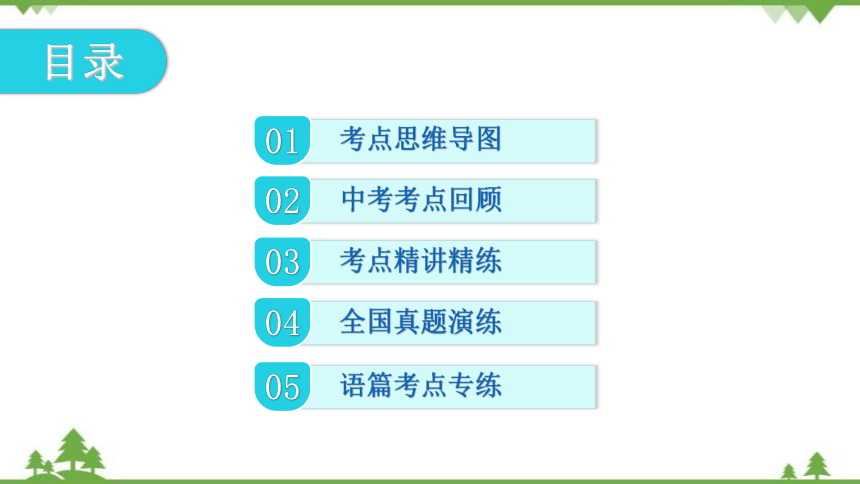
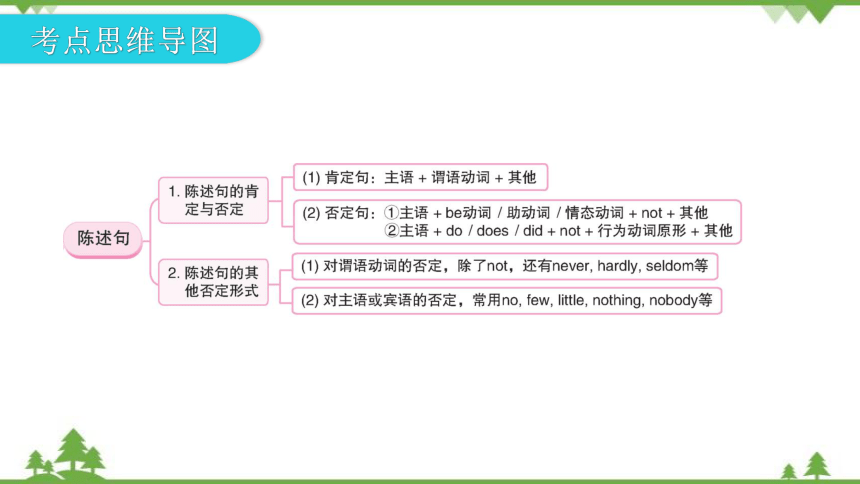
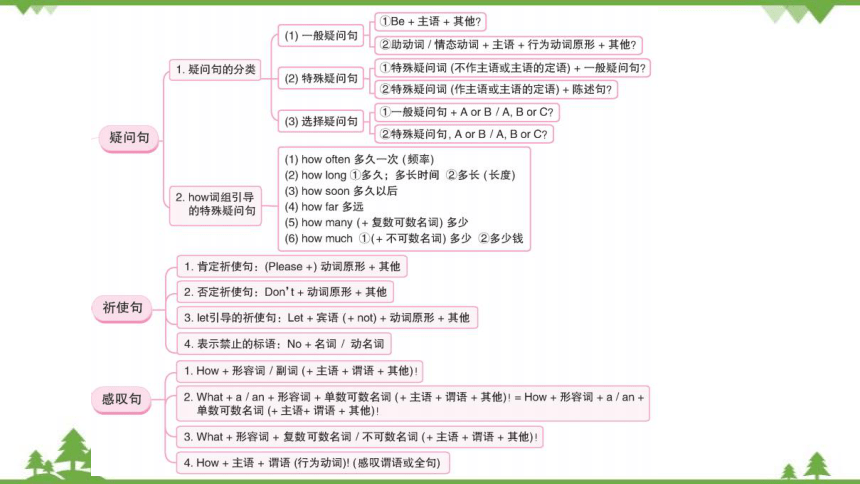
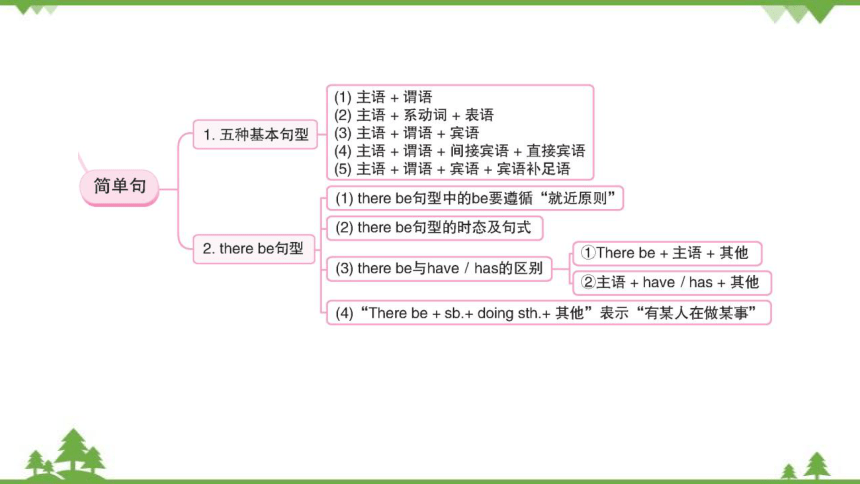
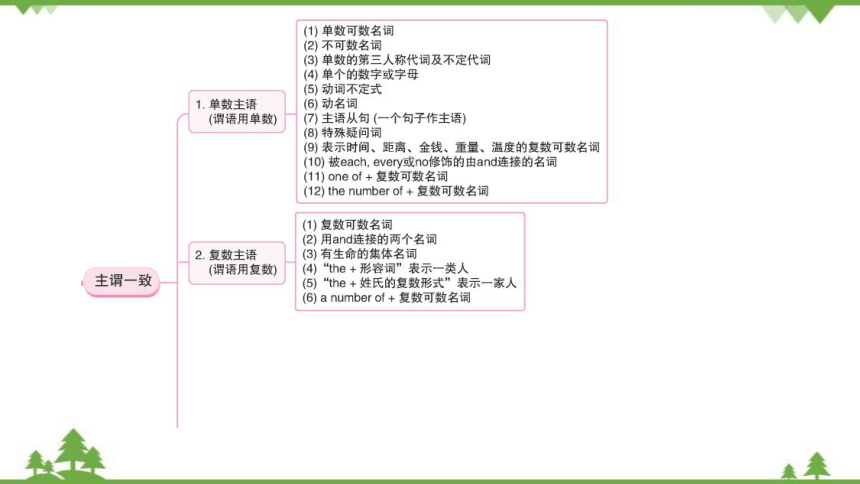
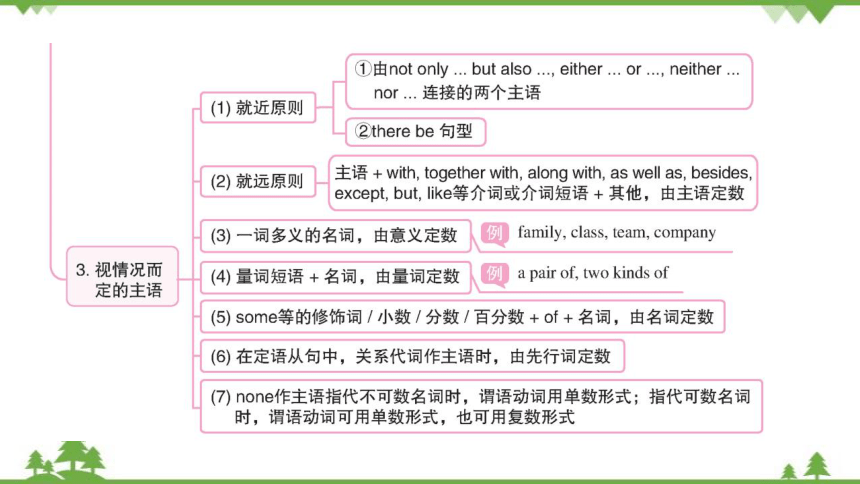
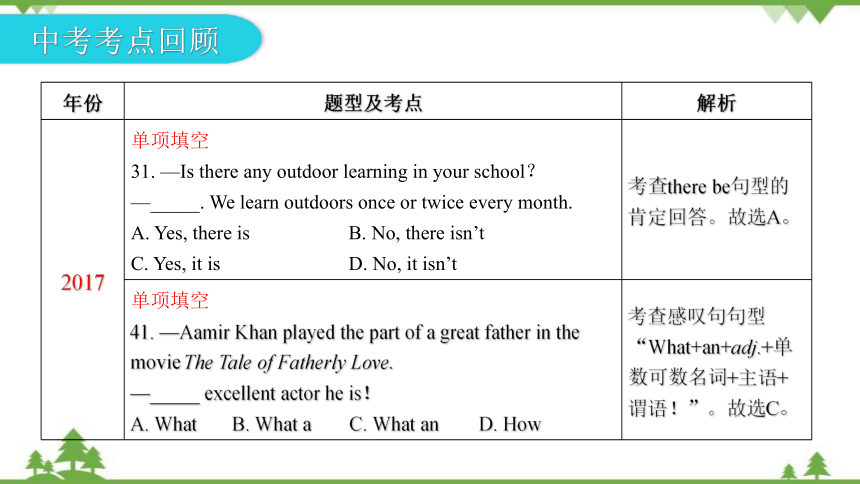
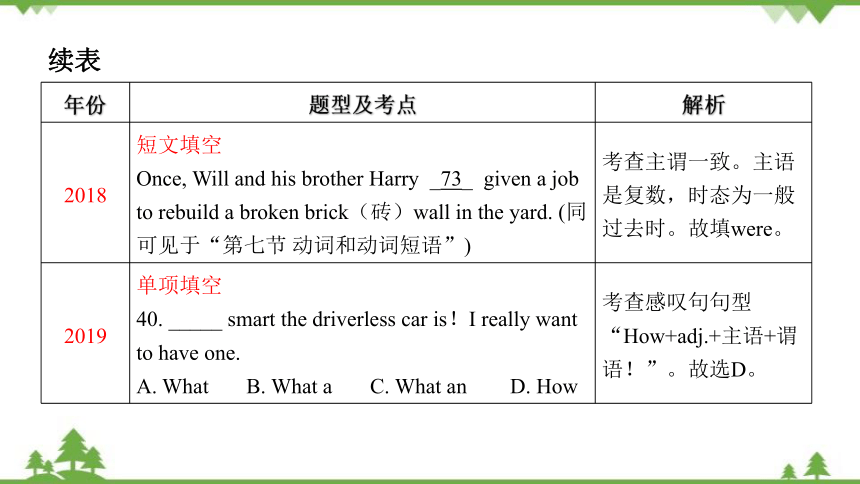
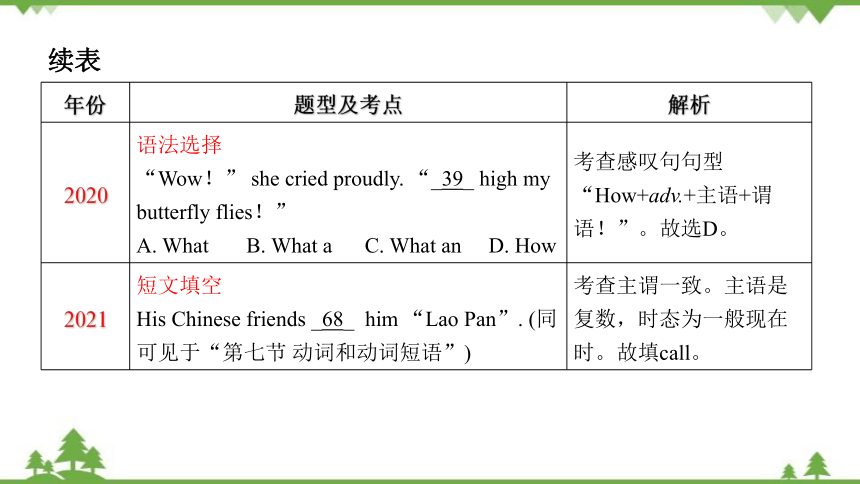

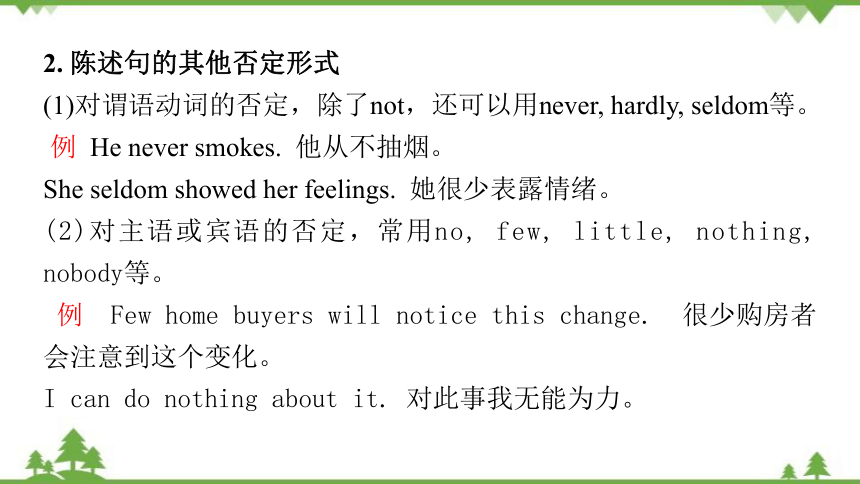
文档简介
(共75张PPT)
第一部分 基于语义的语法知识篇
第十节 句子种类、简单句及主谓一致
目录
01
考点思维导图
02
中考考点回顾
03
考点精讲精练
04
全国真题演练
05
语篇考点专练
考点思维导图
中考考点回顾
年份 题型及考点 解析
2017 单项填空 31. —Is there any outdoor learning in your school? —_____. We learn outdoors once or twice every month. A. Yes, there is B. No, there isn’t C. Yes, it is D. No, it isn’t 考查there be句型的肯定回答。故选A。
单项填空 41. —Aamir Khan played the part of a great father in the movie The Tale of Fatherly Love. —_____ excellent actor he is! A. What B. What a C. What an D. How 考查感叹句句型“What+an+adj.+单数可数名词+主语+谓语!”。故选C。
年份 题型及考点 解析
2018 短文填空 Once, Will and his brother Harry _73_ given a job to rebuild a broken brick(砖)wall in the yard. (同可见于“第七节 动词和动词短语”) 考查主谓一致。主语是复数,时态为一般过去时。故填were。
2019 单项填空 40. _____ smart the driverless car is!I really want to have one. A. What B. What a C. What an D. How 考查感叹句句型“How+adj.+主语+谓语!”。故选D。
续表
年份 题型及考点 解析
2020 语法选择 “Wow!” she cried proudly. “_39_ high my butterfly flies!” A. What B. What a C. What an D. How 考查感叹句句型“How+adv.+主语+谓语!”。故选D。
2021 短文填空 His Chinese friends _68_ him “Lao Pan”. (同可见于“第七节 动词和动词短语”) 考查主谓一致。主语是复数,时态为一般现在时。故填call。
续表
考点精讲精练
考点1
陈述句
陈述句:用来陈述一个事实或阐述一个观点,分为肯定和否定两种形式。
1. 陈述句的肯定与否定
类别 构成 举例
肯定句 主语+谓语动词+其他 China is the largest country in Asia. 中国是亚洲最大的国家。
People usually use smart phones in the 21st century. 在21世纪,人们通常使用智能手机。
否定句 ①主语+be动词/助动词/情态动词+not+其他 ②主语+do/does/did+not+行为动词原形+其他 Japan is not the largest country in Asia. 日本不是亚洲最大的国家。
You must not park here. 你不准在这里停车。
People don’ t often use home phones now. 现在人们不常使用家庭电话。
2. 陈述句的其他否定形式
(1)对谓语动词的否定,除了not,还可以用never, hardly, seldom等。
例 He never smokes. 他从不抽烟。
She seldom showed her feelings. 她很少表露情绪。
(2)对主语或宾语的否定,常用no, few, little, nothing, nobody等。
例 Few home buyers will notice this change. 很少购房者会注意到这个变化。
I can do nothing about it. 对此事我无能为力。
( )1. If you _____ happy with the life you’re living, _____ just complain. Do something about it.
A. aren’t; aren’t B. aren’t; don’t C. don’t; don’t D. don’t; aren’t
( )2. I am very surprised at the new look of my hometown, for it _____ a lot over the years.
A. changed B. didn’t change
C. has changed D. hasn’t changed
B
C
( )3. Mary and Tom _____ have any basketballs, so they want to buy one.
A. don’t B. doesn’t C. isn’t D. aren’t
( )4. I have spent most of my money. Now I have very _____ left.
A. little B. few C. nobody D. nothing
A
A
( )5. _____ young man can afford this house. It’s far too expensive.
A. No B. Not C. Never D. Don’t
A
考点2
疑问句
1. 疑问句的分类
类别 结构 举例
一般疑问句 ①Be+主语+其他? ②助动词/情态动词+主语+行为动词原形+其他? (用yes或no回答) —Was he afraid of the dark 他以前怕黑吗?
—Yes, he was./No, he wasn’ t. 是的,他怕。/不,他不怕。
—Do you like English 你喜欢英语吗?
—Yes, I do./No, I don’t. 是的,我喜欢。/不,我不喜欢。
续表
类别 结构 举例
特殊疑问句 ①特殊疑问词(不作主语或主语的定语)+一般疑问句? ②特殊疑问词(作主语或主语的定语)+陈述句? (常见的特殊疑问词有:who, what, which, whose, why, when, where, how等) —Why do the young seldom go out to the shops now 为什么年轻人现在很少去商店?
—Because they can do the shopping online. 因为他们可以网上购物。
Who can help me 谁能帮我?
续表
类别 结构 举例
选择疑问句 ①一般疑问句+A or B/A, B or C? ②特殊疑问句, A or B/A, B or C? (不能用yes或no回答) —Is the girl with short hair from America or England 那个短发女生是来自美国还是英国?
—She’ s from America. 她来自美国。
—Which do you prefer, cartoons or comedies 卡通片和喜剧,你更喜欢哪个?
—Neither, I like documentaries. 两个都不喜欢。我喜欢纪录片。
2. how词组引导的特殊疑问句:根据句意及回答选择词组
(1) how often 多久一次(频率) 回答:never/every day/twice a month等
例 —How often does an earthquake happen in Sichuan? 在四川,多久发生一次地震?
—Almost every year. 几乎每年都发生。
(2)how long
①多久;多长时间 回答:for+一段时间/since+某个时间点
②多长(长度) 回答:数词+长度单位
例 —How long have you lived here?你在这里住多久了?
—For several months. 有几个月了。
—How long is the Amazon River? 亚马孙河有多长?
—About 6, 440 kilometers. 约6 440千米。
(3)how soon多久以后 回答:in+一段时间
例 —How soon can you finish the work?你还要多久才能完成这项工作?
—In half an hour. 半小时后。
(4)how far 多远 回答:①数词+长度单位
②时间’s+walk/ride/drive/flight等
例 —How far is it from Macao to Hong Kong?澳门距离香港多远?
—About 62 kilometers. 约62千米。
—How far is it from Dongguan to Shenzhen?东莞距离深圳多远?
—About one hour’s drive. 约1小时车程。
(5)how many (+复数可数名词) 多少
例 —How many days did you work this week?你本周上了几天班?
—Five days. 5天。
(6)how much ①(+不可数名词)多少 ②多少钱
例 —How much water do you need?你需要多少水?
—Three cups of water. 3杯水。
—How much is this iPhone? 这部苹果手机多少钱?
—About 5,300 yuan. 约5300元。
( )1. —_____ is the longest hanging bridge for walkers in the world?
—It is 516 meters—over five football fields long.
A. How long B. How high C. How wide D. How soon
( )2. —_____ will the Jinniu Lake Animal Kingdom be open
—Maybe in the second half of this year.
A. Who B. When C. What D. Where
A
B
( )3. —_____ is it from the shopping mall to your home?
—It’s about 8 minutes’ drive.
A. How often B. How long C. How soon D. How far
( )4. —Mary, _____ can we get to the theater?
—It’s hard to say. Maybe in about half an hour.
A. how long B. how often
C. how soon D. how far
D
C
( )5. —_____ do Ronald’s parents let him play computer games
—Once a week.
A. How often B. How long C. How soon D. How far
A
祈使句:主要用来表示请求、命令、建议、叮嘱或祝愿等, 其主语you通常被省略, 谓语动词用原形。
1. 肯定祈使句:(Please+) 动词原形+其他
例 Please stop at the red light!红灯时请停下来!
2. 否定祈使句:Don’t+动词原形+其他
例 Don’t talk in class!在课堂上别说话!
考点3
祈使句
3. let引导的祈使句表示陈述或建议:Let+宾语 (+not)+动词原形+其他
例 Let me hear what people are looking forward to. 让我听听人们在期盼什么。
Let’s not say anything about it. 对于此事,我们什么也别说。
4. 表示禁止的标语:No+名词/动名词
例 No litter!禁止扔垃圾!
No parking!禁止停车!
( )1. Hey, guy, can’t you see the sign over there It says, “_____ Fishing!”
A. No B. Not C. Don’t D. Doesn’t
( )2. _____ more, and you’ll improve your spoken English.
A. To speak B. Speak C. Speaking D. Don’t speak
A
B
( )3. Boys and girls, _____ up your hands if you want to take part in the summer camp.
A. putting B. to put C. put D. not put
( )4. _____ swimming in the river alone! It’s dangerous.
A. Go B. Don’t go C. Going D. Not go
( )5. Let’s ____ so loudly. The baby is sleeping.
A. not to talk B. don’t talk C. doesn’t talk D. not talk
C
B
D
感叹句:用来表达赞美、惊讶、喜悦或气愤等强烈的感情,句末常用“!”。感叹句的常见句型如下:
考点4
感叹句
结构 举例
1. How+形容词/副词 (+主语+谓语+其他)! How nice the weather is today! 今天天气真好!
2. What+a/an+形容词+单数可数名词 (+主语+谓语+其他)!=How+形容词+a / an+单数可数名词 (+主语+谓语+其他)! What a good day we’ ve had today!= How good a day we’ ve had today! 我们今天度过了多么美好的一天啊!
What an exciting game (it was) ! 这场比赛真激烈!
续表
结构 举例
3. What+形容词+复数可数名词/不可数名词 (+主语+谓语+其他)! What beautiful clothes (they are)! 这些衣服真漂亮!
What nice weather (it is today)! 今天天气真好!
4. How+主语+谓语 (行为动词)!(感叹谓语或全句) How I missed you! 我多么想念你啊!
How he wished for a drink! 他多希望能有点东西喝!
( )1. _____ excited news we’ ve just heard! The crewed spaceship Shenzhou-13 launched successfully!
A. What B. What an C. How D. What a
( )2. —_____ hard-working boy Zhou Bin is!
—Yes, he is. I am sure he’ ll pass the test.
A. How B. What a C. What an D. What
A
B
( )3. _____ wonder people the little boy has met!
A. How B. What a C. What an D. What
( )4. _____ lucky they are, I thought, to have each other!
A. What a B. What C. How D. What an
( )5. _____ excellent news reporter he is! All of us are proud of him.
A. What a B. What C. How D. What an
D
C
D
1. 简单句的五种基本句型
考点5
简单句
构成 举例
(1) 主语+谓语 (注:谓语为不及物动词) The accident (主) happened (谓). 意外发生了。
(2) 主语+系动词+表语 Our classroom (主) looks (系) big (表). 我们的教室看起来很大。
Yuan Longping (主) is (系) a great scientist (表). 袁隆平是一名伟大的科学家。
续表
构成 举例
(3)主语+谓语+宾语 (注:谓语为及物动词) Tu Youyou (主) has studied (谓) medicine (宾) all her life. 屠呦呦一生都在研究药物。
(4)主语+谓语+间接宾语+直接宾语 (注:谓语为及物动词) Harry’ s friend (主) is passing (谓) him (间宾) the ball (直宾). 哈利的朋友正在传球给他。
(5)主语+谓语+宾语+宾语补足语 (注:谓语为及物动词) Technology (主) will make (谓) our life (宾) better (宾补). 科技会让我们的生活更美好。
2. there be 句型
(1)遵循“就近原则”:there be 句型中的be 应与其后最近的主语在数上保持一致。
例 There is a notebook and two pens on my desk. 我的书桌上有一本笔记本和两支钢笔。
There are two pens and a notebook on my desk. 我的书桌上有两支钢笔和一本笔记本。
(2)there be句型的时态及句式:
类别 一般现在时 一般过去时 一般将来时
肯定句 There is/are … There was/were … There will be …/
There is going to be …
否定句 There isn’ t/ aren’ t … There wasn’ t/ weren’ t … There won’ t be …/
There isn’ t going to be …
一般疑问句 Is/Are there … Was/Were there … Will there be … /
Is there going to be …
回答 Yes, there is/are. No, there isn’t/ aren’ t. Yes, there was/were. No, there wasn’t/weren’ t. Yes, there will be./Yes, there is going to be.
No, there won’ t be./No, there isn’ t going to be.
(3) there be与have/has的区别:
①there be句型表示“某地存在某人、某物等”。句型:There be+主语+其他。
②have/has表示“(某人)拥有(某物)”。句型:主语+have/has+其他。
(4)一个重要句型:表示“有某人在做某事”,要用“There be+sb.+doing sth.+其他”。
例 There are several children swimming in the river. 河里有几个孩子在游泳。
( )1. There _____ a lot of people here just now. But now nobody appears.
A. were B. are C. was D. is
( )2. Look!There _____ any lemonade (柠檬水) left. Let’s make some now.
A. is B. isn’t C. are D. aren’t
A
A
( )3. —_____ there any good news in today’ s China Daily
—No, but there _____ some funny stories worth reading.
A. Is; is B. Are; are C. Is; are D. Are; is
( )4. —Was there a tall man in the meeting room just now
—_____. I didn’t see anyone there.
A. Yes, there was B. Yes, it was
C. No, it wasn’t D. No, there wasn’t
C
D
( )5. —Mr. Bush says there _____ a soccer match on our school playground tomorrow evening. Will you go and watch it
—Sure, I won’ t miss it.
A. was B. has C. is going to have D. will be
D
主谓一致即谓语动词在人称和数上要和主语保持一致。最基本的原则是:单数主语用单数动词,复数主语用复数动词。但在实际使用当中,情况比较复杂,以下为主谓一致的归纳总结。
考点6
主谓一致
1. 表示单数的主语(谓语动词用单数形式)
要点 举例
(1)单数可数名词 【注意】physics, maths,politics 等学科名词是单数;The United States, The United Nations 等专有名词是单数 The last player to appear was from China. 最后出场的选手来自中国。
(2)不可数名词 Lots of good advice is taken by the leaders. 很多好建议被领导们采纳了。
续表
要点 举例
(3)单数的第三人称代词及不定代词 He/She/It has been missing for 2 hours. 他 / 她 / 它已经失踪两小时。
Nobody knows where they are. 没有人知道他们在哪里。
(4)单个的数字或字母 In China, 9 is a lucky number. 在中国,9是一个幸运的数字。
(5)动词不定式 To work hard is necessary. 努力工作是必需的。
续表
要点 举例
(6)动名词 Crossing the Indian Ocean by plane takes only a few hours nowadays. 现在, 飞越印度洋只需要几个小时。
(7)主语从句(一个句子作主语) What people say is not important. What they do is. 人们说什么不重要。他们做了什么才重要。
(8)特殊疑问词 Who has a watch on hand 谁手上有手表?
续表
要点 举例
(9)表示时间、距离、金钱、重量、温度的复数可数名词作主语,通常被看作一个整体,谓语动词用单数形式 The two months has passed like a pleasant dream. 那两个月像美梦一样过去了。
100 kilometers is not a long distance by car. 100公里的车程并不算长。
Eight thousand dollars is more than she can afford. 她付不起8 000美元。
续表
要点 举例
(10)当由and连接的名词被each, every或no修饰时,谓语动词用单数形式 Each boy and each girl was given an apple just now. 刚刚每个男孩和女孩都得到了一个苹果。
(11)one of+复数可数名词 In the 100-meter final, one of the racers was Su Bingtian, a runner from China. 在100米决赛中,其中一位选手是苏炳添,来自中国的跑步运动员。
(12)the number of+复数可数名词 The number of after-school activities is increasing every year. 课外活动的数目每年都在增加。
2. 表示复数的主语(谓语动词用复数形式)
要点 举例
(1)复数可数名词 The Olympic Games are held every four years. 奥运会每4年举办一次。
(2)用and连接的两个名词 【注意】当用and连接的两个名词表示同一个人时,则谓语动词用单数形式 The writer and the scientist are going to attend the same meeting. They both will give talks at the meeting. 那位作家和那位科学家准备参加同一个会议。他们俩都将在会议上发言。
The writer and scientist was present at the meeting. He also gave a talk. 那位作家兼科学家出席了会议。他还发了言。
续表
要点 举例
(3)有生命的集体名词(people, police等) The police are taking action. 警方正在行动。
(4)“the+形容词”表示一类人(the old, the young, the rich, the poor等) The old are taken good care of in our country. 老人在我们的国家得到很好的照顾。
续表
要点 举例
(5)“the+姓氏的复数形式”表示一家人 The Greens are going to visit the Great Wall next week. 格林一家人下周将去参观长城。
(6)a number of+复数可数名词 A number of after-school activities are on the list for students to choose. 许多课外活动都在清单上供学生选择。
3. 视情况而定的主语
要点 举例
(1)就近原则 ① 由not only … but also …, either … or …, neither … nor … 连接的两个主语,谓语动词的数由最靠近动词的主语决定 Not only the students but also their teacher loves this fun cooking course. 不仅学生们而且他们的老师也喜欢这个有趣的烹饪课程。
Neither my husband nor I am going to eat out tonight. 今晚我的丈夫和我都不打算外出吃饭。
② there be 句型中的be 应与其后最近的主语在数上保持一致 There is a TV and some sofas in the living room. 客厅里有一部电视机和几张沙发。
There are some sofas and a TV in the living room. 客厅里有几张沙发和一部电视机。
续表
要点 举例
(2)就远原则 主语后接with, together with, along with, as well as, besides, except, but, like等介词或介词短语时,谓语动词的数由介词或介词短语前的主语决定 Mr.Lin together with his friends has given away a lot of money to people in the flood area. 林先生和他的朋友们已经捐了很多钱给洪水灾区的人民。
Scientists like him are very popular among the young. 像他那样的科学家很受年轻人欢迎。
续表
要点 举例
(3)一词多义的名词,谓语动词的数根据意义而定 The Internet company was set up last year. 这家网络公司是去年成立的。
The Internet company are mostly young men. 这家网络公司的员工大部分都是年轻人。
family 家庭(单) 家人(复)
class 班级(单) 全班学生(复)
team 队伍(单) 队员(复)
company 公司(单) 公司员工(复)
续表
要点 举例
(4)量词短语(a pair of/two kinds of/3 glasses of等)+名词,谓语动词的数由量词决定 This pair of jeans is the most expensive in the shop. 这条牛仔裤是这家店里最贵的。
8 glasses of water are needed at the meeting room. 会议室需要8杯水。
续表
要点 举例
(5)some等的修饰词/小数/分数/百分数+of+名词, 谓语动词的数由其中的名词决定 Most of the students in our class were for the plan. 我们班多数学生赞成这个计划。
Three fourths of the books are for the students. 四分之三的书是给学生的。
20 percent of the work was done by Fred. 20%的工作是由弗雷德做的。
续表
要点 举例
(6)在定语从句中,关系代词who, that, which等作主语时其谓语动词形式应与先行词保持一致 The boys who are playing there are my students. 在那边玩的男孩们是我的学生。
(7)none作主语指代不可数名词时,谓语动词用单数形式;指代可数名词时,谓语动词可用单数形式,也可用复数形式 —Is there any milk in the cup?杯子里有牛奶吗?
—No, there is none. 没有,一点也没有。
None of them has/have arrived. 他们当中还没有人到达。
( )1. Everyone except those two boys _____ excited about the coming winter camp.
A.is B. are C. has D. have
( )2. Doing sports _____ a good way to lose weight. You can have a try.
A.are B. were C. was D. is
A
D
( )3. Either Jason or his wife _____ to wear a mask when going out. Because it can help to keep COVID-19 away.
A. agree B. agrees C. don’t agree D. doesn’t agree
( )4. In most places, the rich _____ a comfortable life.
A. lives B. doesn’t live C. live D. don’t live
( )5. The whole team _____ all looking forward to their new coach.
A. is B. are C. has D. have
B
C
B
全国真题演练
( )1. —_____ shall we meet for the picnic
—At the school gate. (2021 北京)
A. How B. When C. Why D. Where
( )2. —_____ do you have a sports meeting in your school
—Once a year. We all like sports. (2021 泸州)
A. How much B. How often
C. How long D. How soon
D
B
( )3. —Our class won the first prize in today’s basketball match.
—_____ exciting news it is! We’re all glad about it. (2021 云南)
A.What B. What an C. How D. How an
A
( )4. —He has made many friends since he came here three weeks ago.
—_____ outgoing boy he is! (2021 遂宁)
A. How a B. How C. What a D. What an
( )5. —Ivy, _____ hard you are working!
—President Xi always says that the more hard-working we are, the luckier we will be. (2021 凉山)
A. how B. what C. what a D. what an
A
D
( )6. There _____ an English show this weekend. Shall we go and watch it (2021 新疆)
A. are going to be B. was C. will be D. were
( )7. I plan to travel to America next month, and I think 2,000 dollars _____ enough. (2021 广元)
A. was B. are C. is D. were
C
C
( )8. —Jane, I rang you up last night but nobody answered.
—Oh, I together with my parents _____ walks in the park then. (2021 达州)
A. have taken B. was taking
C. were taking D. had taken
( )9. The number of the whales _____smaller and smaller because of human activities now. (2021 遂宁)
A. were B. was C. is D. are
B
C
( )10. Fresh water _____ more important than anything else.(2021 黑龙江)
A. is B. are C. was
A
一、语法选择
Last August we went to a waterfall. There _1_ a number of people playing in the water.
Sitting on the rocks, I with my husband _2_ watching some parents nervously guarding their kids away from the rocks’ edges(边缘). I felt glad that our 8-year-old son Wyatt could look after himself. “_3_ running,” I said to him from time to time. “_4_ away from the edges.” But I soon relaxed, and we were all having fun in the water.
语篇考点专练
were
was
No
Stay
Suddenly, l saw Wyatt sit down between two rocks in the running water. Then he disappeared over the edge.
“Somebody help my son!” I cried, over and over. But I only heard a husband said to his wife, “We are leaving!” “Please _5_ go!” I begged(乞求). But they walked straight away.
When I climbed down to the rocks, my husband had pulled Wyatt out of the water with the help of a young woman. She was
don’t
giving first aid. “I’m Lisa, a nurse. I’m not leaving you.” “_6_ warmhearted lady you are!” I couldn’t help crying. Not only I but also my husband _7_ thankful to Lisa.
Wyatt _8_ to the hospital immediately. The next 8 hours _9_ a sleepless night for us, then we were told Wyatt was going to be OK. “_10_ can he leave for home, doctor ” I asked. “In 2 days.”
Meeting Lisa has reminded me how we need help from people we don’ t know.
What a
was
was taken
was
How soon
( )1. A. was B. were C. has D. have
( )2. A. are B. is C. was D. were
( )3. A. Don’t B. Not C. No D. Never
( )4. A. To stay B. Staying
C. Stayed D. Stay
( )5. A. don’t B. no C. not D. doesn’t
B
C
C
D
A
( )6. A. How B. What C. What a D. What an
( )7. A. were B. was C. are D. is
( )8. A. was taken B. was taking
C. were taking D. were taken
( )9. A. is B. are C . were D. was
( )10. A. How long B. How often
C. How far D. How soon
C
B
A
D
D
二、短文填空
Dear Fatima,
Thank you for your letter. Now I want to tell you something about my trip to Paris Disneyland. I went there with my family last week. _1_ great the trip was!
First we went to see the Sleeping Beauty’s Castle. My younger sister Annette _2_ that best. When we got into the castle, we didn’ t say anything because we didn’ t want to wake up the
How
liked
sleeping lady. Visitors around us did the same as us. _3_ a quiet place it was! We went to the Pirates of the Caribbean area. We visited it in a boat. I really thought we _4_ living in those exciting times, but without the danger of the course. At last we arrived at the Peter Pan ride. We wanted to fly through the air over London. There _5_ also a ride that actually went upside down. I didn’ t dare to get on it, but my dad _6_.
What
were
was
did
_7_ you often go out for a trip _8_ do you usually go on vacation with I _9_ to know more about you. Please _10_ to me soon!
Love,
Louise
Do
Who / Whom
want
write
1. _____________ 2. ______________
3. _____________ 4. ______________
5. _____________ 6. ______________
7. _____________ 8. ______________
9. _____________ 10. _____________
How
liked
What
were
was
did
Do
Who / Whom
want
write
谢 谢!
第一部分 基于语义的语法知识篇
第十节 句子种类、简单句及主谓一致
目录
01
考点思维导图
02
中考考点回顾
03
考点精讲精练
04
全国真题演练
05
语篇考点专练
考点思维导图
中考考点回顾
年份 题型及考点 解析
2017 单项填空 31. —Is there any outdoor learning in your school? —_____. We learn outdoors once or twice every month. A. Yes, there is B. No, there isn’t C. Yes, it is D. No, it isn’t 考查there be句型的肯定回答。故选A。
单项填空 41. —Aamir Khan played the part of a great father in the movie The Tale of Fatherly Love. —_____ excellent actor he is! A. What B. What a C. What an D. How 考查感叹句句型“What+an+adj.+单数可数名词+主语+谓语!”。故选C。
年份 题型及考点 解析
2018 短文填空 Once, Will and his brother Harry _73_ given a job to rebuild a broken brick(砖)wall in the yard. (同可见于“第七节 动词和动词短语”) 考查主谓一致。主语是复数,时态为一般过去时。故填were。
2019 单项填空 40. _____ smart the driverless car is!I really want to have one. A. What B. What a C. What an D. How 考查感叹句句型“How+adj.+主语+谓语!”。故选D。
续表
年份 题型及考点 解析
2020 语法选择 “Wow!” she cried proudly. “_39_ high my butterfly flies!” A. What B. What a C. What an D. How 考查感叹句句型“How+adv.+主语+谓语!”。故选D。
2021 短文填空 His Chinese friends _68_ him “Lao Pan”. (同可见于“第七节 动词和动词短语”) 考查主谓一致。主语是复数,时态为一般现在时。故填call。
续表
考点精讲精练
考点1
陈述句
陈述句:用来陈述一个事实或阐述一个观点,分为肯定和否定两种形式。
1. 陈述句的肯定与否定
类别 构成 举例
肯定句 主语+谓语动词+其他 China is the largest country in Asia. 中国是亚洲最大的国家。
People usually use smart phones in the 21st century. 在21世纪,人们通常使用智能手机。
否定句 ①主语+be动词/助动词/情态动词+not+其他 ②主语+do/does/did+not+行为动词原形+其他 Japan is not the largest country in Asia. 日本不是亚洲最大的国家。
You must not park here. 你不准在这里停车。
People don’ t often use home phones now. 现在人们不常使用家庭电话。
2. 陈述句的其他否定形式
(1)对谓语动词的否定,除了not,还可以用never, hardly, seldom等。
例 He never smokes. 他从不抽烟。
She seldom showed her feelings. 她很少表露情绪。
(2)对主语或宾语的否定,常用no, few, little, nothing, nobody等。
例 Few home buyers will notice this change. 很少购房者会注意到这个变化。
I can do nothing about it. 对此事我无能为力。
( )1. If you _____ happy with the life you’re living, _____ just complain. Do something about it.
A. aren’t; aren’t B. aren’t; don’t C. don’t; don’t D. don’t; aren’t
( )2. I am very surprised at the new look of my hometown, for it _____ a lot over the years.
A. changed B. didn’t change
C. has changed D. hasn’t changed
B
C
( )3. Mary and Tom _____ have any basketballs, so they want to buy one.
A. don’t B. doesn’t C. isn’t D. aren’t
( )4. I have spent most of my money. Now I have very _____ left.
A. little B. few C. nobody D. nothing
A
A
( )5. _____ young man can afford this house. It’s far too expensive.
A. No B. Not C. Never D. Don’t
A
考点2
疑问句
1. 疑问句的分类
类别 结构 举例
一般疑问句 ①Be+主语+其他? ②助动词/情态动词+主语+行为动词原形+其他? (用yes或no回答) —Was he afraid of the dark 他以前怕黑吗?
—Yes, he was./No, he wasn’ t. 是的,他怕。/不,他不怕。
—Do you like English 你喜欢英语吗?
—Yes, I do./No, I don’t. 是的,我喜欢。/不,我不喜欢。
续表
类别 结构 举例
特殊疑问句 ①特殊疑问词(不作主语或主语的定语)+一般疑问句? ②特殊疑问词(作主语或主语的定语)+陈述句? (常见的特殊疑问词有:who, what, which, whose, why, when, where, how等) —Why do the young seldom go out to the shops now 为什么年轻人现在很少去商店?
—Because they can do the shopping online. 因为他们可以网上购物。
Who can help me 谁能帮我?
续表
类别 结构 举例
选择疑问句 ①一般疑问句+A or B/A, B or C? ②特殊疑问句, A or B/A, B or C? (不能用yes或no回答) —Is the girl with short hair from America or England 那个短发女生是来自美国还是英国?
—She’ s from America. 她来自美国。
—Which do you prefer, cartoons or comedies 卡通片和喜剧,你更喜欢哪个?
—Neither, I like documentaries. 两个都不喜欢。我喜欢纪录片。
2. how词组引导的特殊疑问句:根据句意及回答选择词组
(1) how often 多久一次(频率) 回答:never/every day/twice a month等
例 —How often does an earthquake happen in Sichuan? 在四川,多久发生一次地震?
—Almost every year. 几乎每年都发生。
(2)how long
①多久;多长时间 回答:for+一段时间/since+某个时间点
②多长(长度) 回答:数词+长度单位
例 —How long have you lived here?你在这里住多久了?
—For several months. 有几个月了。
—How long is the Amazon River? 亚马孙河有多长?
—About 6, 440 kilometers. 约6 440千米。
(3)how soon多久以后 回答:in+一段时间
例 —How soon can you finish the work?你还要多久才能完成这项工作?
—In half an hour. 半小时后。
(4)how far 多远 回答:①数词+长度单位
②时间’s+walk/ride/drive/flight等
例 —How far is it from Macao to Hong Kong?澳门距离香港多远?
—About 62 kilometers. 约62千米。
—How far is it from Dongguan to Shenzhen?东莞距离深圳多远?
—About one hour’s drive. 约1小时车程。
(5)how many (+复数可数名词) 多少
例 —How many days did you work this week?你本周上了几天班?
—Five days. 5天。
(6)how much ①(+不可数名词)多少 ②多少钱
例 —How much water do you need?你需要多少水?
—Three cups of water. 3杯水。
—How much is this iPhone? 这部苹果手机多少钱?
—About 5,300 yuan. 约5300元。
( )1. —_____ is the longest hanging bridge for walkers in the world?
—It is 516 meters—over five football fields long.
A. How long B. How high C. How wide D. How soon
( )2. —_____ will the Jinniu Lake Animal Kingdom be open
—Maybe in the second half of this year.
A. Who B. When C. What D. Where
A
B
( )3. —_____ is it from the shopping mall to your home?
—It’s about 8 minutes’ drive.
A. How often B. How long C. How soon D. How far
( )4. —Mary, _____ can we get to the theater?
—It’s hard to say. Maybe in about half an hour.
A. how long B. how often
C. how soon D. how far
D
C
( )5. —_____ do Ronald’s parents let him play computer games
—Once a week.
A. How often B. How long C. How soon D. How far
A
祈使句:主要用来表示请求、命令、建议、叮嘱或祝愿等, 其主语you通常被省略, 谓语动词用原形。
1. 肯定祈使句:(Please+) 动词原形+其他
例 Please stop at the red light!红灯时请停下来!
2. 否定祈使句:Don’t+动词原形+其他
例 Don’t talk in class!在课堂上别说话!
考点3
祈使句
3. let引导的祈使句表示陈述或建议:Let+宾语 (+not)+动词原形+其他
例 Let me hear what people are looking forward to. 让我听听人们在期盼什么。
Let’s not say anything about it. 对于此事,我们什么也别说。
4. 表示禁止的标语:No+名词/动名词
例 No litter!禁止扔垃圾!
No parking!禁止停车!
( )1. Hey, guy, can’t you see the sign over there It says, “_____ Fishing!”
A. No B. Not C. Don’t D. Doesn’t
( )2. _____ more, and you’ll improve your spoken English.
A. To speak B. Speak C. Speaking D. Don’t speak
A
B
( )3. Boys and girls, _____ up your hands if you want to take part in the summer camp.
A. putting B. to put C. put D. not put
( )4. _____ swimming in the river alone! It’s dangerous.
A. Go B. Don’t go C. Going D. Not go
( )5. Let’s ____ so loudly. The baby is sleeping.
A. not to talk B. don’t talk C. doesn’t talk D. not talk
C
B
D
感叹句:用来表达赞美、惊讶、喜悦或气愤等强烈的感情,句末常用“!”。感叹句的常见句型如下:
考点4
感叹句
结构 举例
1. How+形容词/副词 (+主语+谓语+其他)! How nice the weather is today! 今天天气真好!
2. What+a/an+形容词+单数可数名词 (+主语+谓语+其他)!=How+形容词+a / an+单数可数名词 (+主语+谓语+其他)! What a good day we’ ve had today!= How good a day we’ ve had today! 我们今天度过了多么美好的一天啊!
What an exciting game (it was) ! 这场比赛真激烈!
续表
结构 举例
3. What+形容词+复数可数名词/不可数名词 (+主语+谓语+其他)! What beautiful clothes (they are)! 这些衣服真漂亮!
What nice weather (it is today)! 今天天气真好!
4. How+主语+谓语 (行为动词)!(感叹谓语或全句) How I missed you! 我多么想念你啊!
How he wished for a drink! 他多希望能有点东西喝!
( )1. _____ excited news we’ ve just heard! The crewed spaceship Shenzhou-13 launched successfully!
A. What B. What an C. How D. What a
( )2. —_____ hard-working boy Zhou Bin is!
—Yes, he is. I am sure he’ ll pass the test.
A. How B. What a C. What an D. What
A
B
( )3. _____ wonder people the little boy has met!
A. How B. What a C. What an D. What
( )4. _____ lucky they are, I thought, to have each other!
A. What a B. What C. How D. What an
( )5. _____ excellent news reporter he is! All of us are proud of him.
A. What a B. What C. How D. What an
D
C
D
1. 简单句的五种基本句型
考点5
简单句
构成 举例
(1) 主语+谓语 (注:谓语为不及物动词) The accident (主) happened (谓). 意外发生了。
(2) 主语+系动词+表语 Our classroom (主) looks (系) big (表). 我们的教室看起来很大。
Yuan Longping (主) is (系) a great scientist (表). 袁隆平是一名伟大的科学家。
续表
构成 举例
(3)主语+谓语+宾语 (注:谓语为及物动词) Tu Youyou (主) has studied (谓) medicine (宾) all her life. 屠呦呦一生都在研究药物。
(4)主语+谓语+间接宾语+直接宾语 (注:谓语为及物动词) Harry’ s friend (主) is passing (谓) him (间宾) the ball (直宾). 哈利的朋友正在传球给他。
(5)主语+谓语+宾语+宾语补足语 (注:谓语为及物动词) Technology (主) will make (谓) our life (宾) better (宾补). 科技会让我们的生活更美好。
2. there be 句型
(1)遵循“就近原则”:there be 句型中的be 应与其后最近的主语在数上保持一致。
例 There is a notebook and two pens on my desk. 我的书桌上有一本笔记本和两支钢笔。
There are two pens and a notebook on my desk. 我的书桌上有两支钢笔和一本笔记本。
(2)there be句型的时态及句式:
类别 一般现在时 一般过去时 一般将来时
肯定句 There is/are … There was/were … There will be …/
There is going to be …
否定句 There isn’ t/ aren’ t … There wasn’ t/ weren’ t … There won’ t be …/
There isn’ t going to be …
一般疑问句 Is/Are there … Was/Were there … Will there be … /
Is there going to be …
回答 Yes, there is/are. No, there isn’t/ aren’ t. Yes, there was/were. No, there wasn’t/weren’ t. Yes, there will be./Yes, there is going to be.
No, there won’ t be./No, there isn’ t going to be.
(3) there be与have/has的区别:
①there be句型表示“某地存在某人、某物等”。句型:There be+主语+其他。
②have/has表示“(某人)拥有(某物)”。句型:主语+have/has+其他。
(4)一个重要句型:表示“有某人在做某事”,要用“There be+sb.+doing sth.+其他”。
例 There are several children swimming in the river. 河里有几个孩子在游泳。
( )1. There _____ a lot of people here just now. But now nobody appears.
A. were B. are C. was D. is
( )2. Look!There _____ any lemonade (柠檬水) left. Let’s make some now.
A. is B. isn’t C. are D. aren’t
A
A
( )3. —_____ there any good news in today’ s China Daily
—No, but there _____ some funny stories worth reading.
A. Is; is B. Are; are C. Is; are D. Are; is
( )4. —Was there a tall man in the meeting room just now
—_____. I didn’t see anyone there.
A. Yes, there was B. Yes, it was
C. No, it wasn’t D. No, there wasn’t
C
D
( )5. —Mr. Bush says there _____ a soccer match on our school playground tomorrow evening. Will you go and watch it
—Sure, I won’ t miss it.
A. was B. has C. is going to have D. will be
D
主谓一致即谓语动词在人称和数上要和主语保持一致。最基本的原则是:单数主语用单数动词,复数主语用复数动词。但在实际使用当中,情况比较复杂,以下为主谓一致的归纳总结。
考点6
主谓一致
1. 表示单数的主语(谓语动词用单数形式)
要点 举例
(1)单数可数名词 【注意】physics, maths,politics 等学科名词是单数;The United States, The United Nations 等专有名词是单数 The last player to appear was from China. 最后出场的选手来自中国。
(2)不可数名词 Lots of good advice is taken by the leaders. 很多好建议被领导们采纳了。
续表
要点 举例
(3)单数的第三人称代词及不定代词 He/She/It has been missing for 2 hours. 他 / 她 / 它已经失踪两小时。
Nobody knows where they are. 没有人知道他们在哪里。
(4)单个的数字或字母 In China, 9 is a lucky number. 在中国,9是一个幸运的数字。
(5)动词不定式 To work hard is necessary. 努力工作是必需的。
续表
要点 举例
(6)动名词 Crossing the Indian Ocean by plane takes only a few hours nowadays. 现在, 飞越印度洋只需要几个小时。
(7)主语从句(一个句子作主语) What people say is not important. What they do is. 人们说什么不重要。他们做了什么才重要。
(8)特殊疑问词 Who has a watch on hand 谁手上有手表?
续表
要点 举例
(9)表示时间、距离、金钱、重量、温度的复数可数名词作主语,通常被看作一个整体,谓语动词用单数形式 The two months has passed like a pleasant dream. 那两个月像美梦一样过去了。
100 kilometers is not a long distance by car. 100公里的车程并不算长。
Eight thousand dollars is more than she can afford. 她付不起8 000美元。
续表
要点 举例
(10)当由and连接的名词被each, every或no修饰时,谓语动词用单数形式 Each boy and each girl was given an apple just now. 刚刚每个男孩和女孩都得到了一个苹果。
(11)one of+复数可数名词 In the 100-meter final, one of the racers was Su Bingtian, a runner from China. 在100米决赛中,其中一位选手是苏炳添,来自中国的跑步运动员。
(12)the number of+复数可数名词 The number of after-school activities is increasing every year. 课外活动的数目每年都在增加。
2. 表示复数的主语(谓语动词用复数形式)
要点 举例
(1)复数可数名词 The Olympic Games are held every four years. 奥运会每4年举办一次。
(2)用and连接的两个名词 【注意】当用and连接的两个名词表示同一个人时,则谓语动词用单数形式 The writer and the scientist are going to attend the same meeting. They both will give talks at the meeting. 那位作家和那位科学家准备参加同一个会议。他们俩都将在会议上发言。
The writer and scientist was present at the meeting. He also gave a talk. 那位作家兼科学家出席了会议。他还发了言。
续表
要点 举例
(3)有生命的集体名词(people, police等) The police are taking action. 警方正在行动。
(4)“the+形容词”表示一类人(the old, the young, the rich, the poor等) The old are taken good care of in our country. 老人在我们的国家得到很好的照顾。
续表
要点 举例
(5)“the+姓氏的复数形式”表示一家人 The Greens are going to visit the Great Wall next week. 格林一家人下周将去参观长城。
(6)a number of+复数可数名词 A number of after-school activities are on the list for students to choose. 许多课外活动都在清单上供学生选择。
3. 视情况而定的主语
要点 举例
(1)就近原则 ① 由not only … but also …, either … or …, neither … nor … 连接的两个主语,谓语动词的数由最靠近动词的主语决定 Not only the students but also their teacher loves this fun cooking course. 不仅学生们而且他们的老师也喜欢这个有趣的烹饪课程。
Neither my husband nor I am going to eat out tonight. 今晚我的丈夫和我都不打算外出吃饭。
② there be 句型中的be 应与其后最近的主语在数上保持一致 There is a TV and some sofas in the living room. 客厅里有一部电视机和几张沙发。
There are some sofas and a TV in the living room. 客厅里有几张沙发和一部电视机。
续表
要点 举例
(2)就远原则 主语后接with, together with, along with, as well as, besides, except, but, like等介词或介词短语时,谓语动词的数由介词或介词短语前的主语决定 Mr.Lin together with his friends has given away a lot of money to people in the flood area. 林先生和他的朋友们已经捐了很多钱给洪水灾区的人民。
Scientists like him are very popular among the young. 像他那样的科学家很受年轻人欢迎。
续表
要点 举例
(3)一词多义的名词,谓语动词的数根据意义而定 The Internet company was set up last year. 这家网络公司是去年成立的。
The Internet company are mostly young men. 这家网络公司的员工大部分都是年轻人。
family 家庭(单) 家人(复)
class 班级(单) 全班学生(复)
team 队伍(单) 队员(复)
company 公司(单) 公司员工(复)
续表
要点 举例
(4)量词短语(a pair of/two kinds of/3 glasses of等)+名词,谓语动词的数由量词决定 This pair of jeans is the most expensive in the shop. 这条牛仔裤是这家店里最贵的。
8 glasses of water are needed at the meeting room. 会议室需要8杯水。
续表
要点 举例
(5)some等的修饰词/小数/分数/百分数+of+名词, 谓语动词的数由其中的名词决定 Most of the students in our class were for the plan. 我们班多数学生赞成这个计划。
Three fourths of the books are for the students. 四分之三的书是给学生的。
20 percent of the work was done by Fred. 20%的工作是由弗雷德做的。
续表
要点 举例
(6)在定语从句中,关系代词who, that, which等作主语时其谓语动词形式应与先行词保持一致 The boys who are playing there are my students. 在那边玩的男孩们是我的学生。
(7)none作主语指代不可数名词时,谓语动词用单数形式;指代可数名词时,谓语动词可用单数形式,也可用复数形式 —Is there any milk in the cup?杯子里有牛奶吗?
—No, there is none. 没有,一点也没有。
None of them has/have arrived. 他们当中还没有人到达。
( )1. Everyone except those two boys _____ excited about the coming winter camp.
A.is B. are C. has D. have
( )2. Doing sports _____ a good way to lose weight. You can have a try.
A.are B. were C. was D. is
A
D
( )3. Either Jason or his wife _____ to wear a mask when going out. Because it can help to keep COVID-19 away.
A. agree B. agrees C. don’t agree D. doesn’t agree
( )4. In most places, the rich _____ a comfortable life.
A. lives B. doesn’t live C. live D. don’t live
( )5. The whole team _____ all looking forward to their new coach.
A. is B. are C. has D. have
B
C
B
全国真题演练
( )1. —_____ shall we meet for the picnic
—At the school gate. (2021 北京)
A. How B. When C. Why D. Where
( )2. —_____ do you have a sports meeting in your school
—Once a year. We all like sports. (2021 泸州)
A. How much B. How often
C. How long D. How soon
D
B
( )3. —Our class won the first prize in today’s basketball match.
—_____ exciting news it is! We’re all glad about it. (2021 云南)
A.What B. What an C. How D. How an
A
( )4. —He has made many friends since he came here three weeks ago.
—_____ outgoing boy he is! (2021 遂宁)
A. How a B. How C. What a D. What an
( )5. —Ivy, _____ hard you are working!
—President Xi always says that the more hard-working we are, the luckier we will be. (2021 凉山)
A. how B. what C. what a D. what an
A
D
( )6. There _____ an English show this weekend. Shall we go and watch it (2021 新疆)
A. are going to be B. was C. will be D. were
( )7. I plan to travel to America next month, and I think 2,000 dollars _____ enough. (2021 广元)
A. was B. are C. is D. were
C
C
( )8. —Jane, I rang you up last night but nobody answered.
—Oh, I together with my parents _____ walks in the park then. (2021 达州)
A. have taken B. was taking
C. were taking D. had taken
( )9. The number of the whales _____smaller and smaller because of human activities now. (2021 遂宁)
A. were B. was C. is D. are
B
C
( )10. Fresh water _____ more important than anything else.(2021 黑龙江)
A. is B. are C. was
A
一、语法选择
Last August we went to a waterfall. There _1_ a number of people playing in the water.
Sitting on the rocks, I with my husband _2_ watching some parents nervously guarding their kids away from the rocks’ edges(边缘). I felt glad that our 8-year-old son Wyatt could look after himself. “_3_ running,” I said to him from time to time. “_4_ away from the edges.” But I soon relaxed, and we were all having fun in the water.
语篇考点专练
were
was
No
Stay
Suddenly, l saw Wyatt sit down between two rocks in the running water. Then he disappeared over the edge.
“Somebody help my son!” I cried, over and over. But I only heard a husband said to his wife, “We are leaving!” “Please _5_ go!” I begged(乞求). But they walked straight away.
When I climbed down to the rocks, my husband had pulled Wyatt out of the water with the help of a young woman. She was
don’t
giving first aid. “I’m Lisa, a nurse. I’m not leaving you.” “_6_ warmhearted lady you are!” I couldn’t help crying. Not only I but also my husband _7_ thankful to Lisa.
Wyatt _8_ to the hospital immediately. The next 8 hours _9_ a sleepless night for us, then we were told Wyatt was going to be OK. “_10_ can he leave for home, doctor ” I asked. “In 2 days.”
Meeting Lisa has reminded me how we need help from people we don’ t know.
What a
was
was taken
was
How soon
( )1. A. was B. were C. has D. have
( )2. A. are B. is C. was D. were
( )3. A. Don’t B. Not C. No D. Never
( )4. A. To stay B. Staying
C. Stayed D. Stay
( )5. A. don’t B. no C. not D. doesn’t
B
C
C
D
A
( )6. A. How B. What C. What a D. What an
( )7. A. were B. was C. are D. is
( )8. A. was taken B. was taking
C. were taking D. were taken
( )9. A. is B. are C . were D. was
( )10. A. How long B. How often
C. How far D. How soon
C
B
A
D
D
二、短文填空
Dear Fatima,
Thank you for your letter. Now I want to tell you something about my trip to Paris Disneyland. I went there with my family last week. _1_ great the trip was!
First we went to see the Sleeping Beauty’s Castle. My younger sister Annette _2_ that best. When we got into the castle, we didn’ t say anything because we didn’ t want to wake up the
How
liked
sleeping lady. Visitors around us did the same as us. _3_ a quiet place it was! We went to the Pirates of the Caribbean area. We visited it in a boat. I really thought we _4_ living in those exciting times, but without the danger of the course. At last we arrived at the Peter Pan ride. We wanted to fly through the air over London. There _5_ also a ride that actually went upside down. I didn’ t dare to get on it, but my dad _6_.
What
were
was
did
_7_ you often go out for a trip _8_ do you usually go on vacation with I _9_ to know more about you. Please _10_ to me soon!
Love,
Louise
Do
Who / Whom
want
write
1. _____________ 2. ______________
3. _____________ 4. ______________
5. _____________ 6. ______________
7. _____________ 8. ______________
9. _____________ 10. _____________
How
liked
What
were
was
did
Do
Who / Whom
want
write
谢 谢!
同课章节目录
- 词法
- 名词
- 动词和动词短语
- 动词语态
- 动词时态
- 助动词和情态动词
- 非谓语动词
- 冠词
- 代词
- 数词和量词
- 形容词副词及其比较等级
- 介词和介词短语
- 连词和感叹词
- 构词法
- 相似、相近词比较
- 句法
- 陈述句
- 一般疑问句和否定疑问句
- 特殊疑问句及选择疑问句
- 反意疑问句
- 存在句(There be句型)
- 宾语从句
- 定语从句
- 状语从句
- 主谓一致问题
- 简单句
- 并列句
- 复合句
- 主谓一致
- 主、表语从句
- 名词性从句
- 直接引语和间接引语
- 虚拟语气
- 感叹句
- 强调句
- 倒装句
- 祈使句
- 句子的成分
- 句子的分类
- 题型专区
- 单项选择部分
- 易错题
- 完形填空
- 阅读理解
- 词汇练习
- 听说训练
- 句型转换
- 补全对话
- 短文改错
- 翻译
- 书面表达
- 任务型阅读
- 语法填空
- 其他资料
